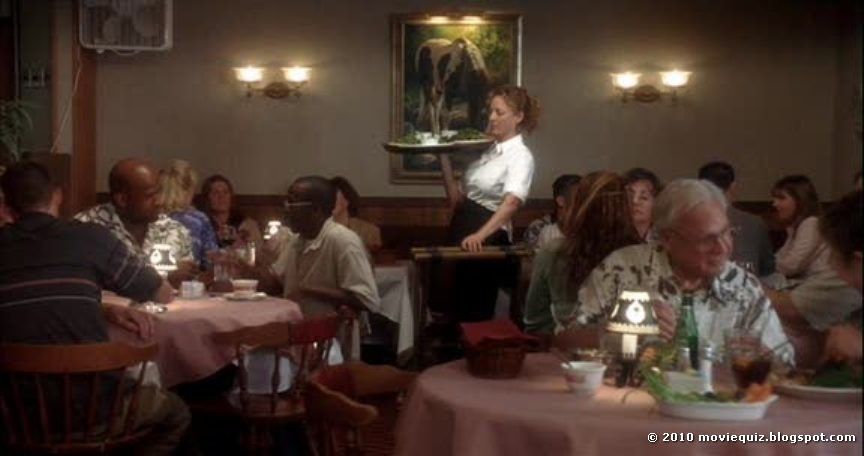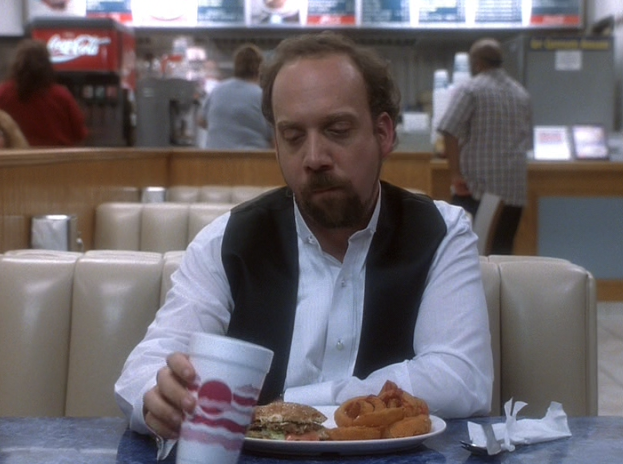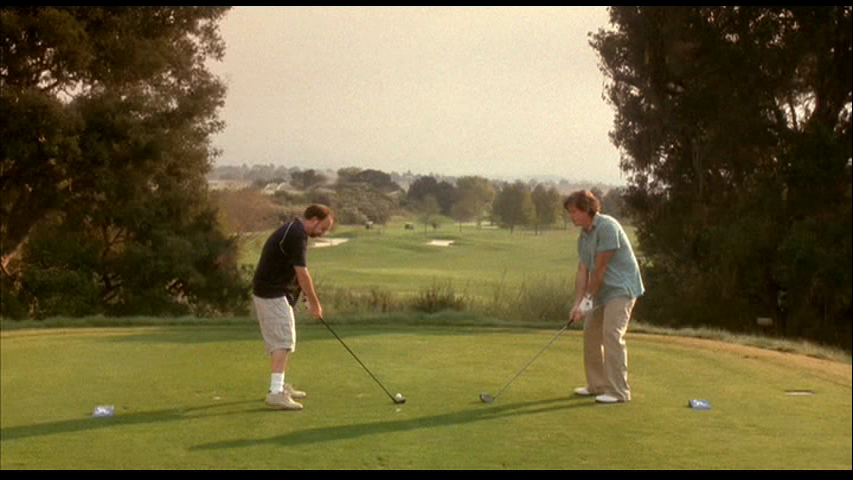Sideways
2003
Director: my new crush Alexander Payne
Starring: Paul Giamatti, Thomas Haden
Church, Virginia Madsen, Sandra Oh
Sideways fits perfectly into the
sub-genre of film that is probably my most favorite type of movie ever: the
small scale character-driven comedy that is heavy on melancholia. If my film diet was nothing but this sort of
film, I honestly don’t think I’d grow tired of it. Given my predisposition to liking this type
of movie, when a really GOOD film from this sub-genre appears on the scene, so
much the better; how quickly can I own it?
Miles
(Giamatti) is a struggling writer-cum-middle school English teacher who is
still trying to get over his two-year-old divorce. His good friend Jack (Haden Church) is
getting married, though, and Miles is determined to send Jack off in style with
a weeklong getaway to California wine country.
See, Miles loves wine to the point of absurd pretension, and to him, a
trip of tastings is sheer bliss. Jack
has other plans, however, and he soon makes good on them by shacking up with
winery employee Stephanie (Oh) for the week – without telling her he’s about to
get married. Stephanie’s friend Maya
(Madsen) is also a big fan of wine, and shows enough interest in Miles to start
to snap him out of his coma of depression and anxiety.
The
first and most immediate thing I responded to in Sideways is the
characters. This is Miles’ story, and he
is our hero, but he is utterly, painfully real.
Miles is deeply flawed, but I love him for it. I can easily understand someone hating Miles,
or at least disliking him, because he has many less than palatable traits on
full display. He’s a downer; his
depression and anxiety are eating away at him.
He’s pretentious – not only about wine, but academically as well. His novel doesn’t sound at all intriguing,
and instead sounds like a big ole mess.
He seems constantly annoyed by his friend Jack. He bumbles and fumbles his way around Maya,
letting his fear constantly win. He even
steals from his mother. Despite all of
that, though, I love Miles because he is, deep down, a good person going
through a really rough time. He is
fragile and is trying to put his life back together. He is lonely and sad, and I desperately want
him not be lonely and sad. Despite
superficial appearances, he loves his friends and family and is loyal to
them. The way he lights up when he talks
about wine, however snobby he may sound, is fun to watch. I want Miles to win. I want Miles to deal with his personal
demons. I want Miles to be happy.
Giamatti’s
performance is mostly why I love the character Miles. Giamatti just breaks my heart, over and over
again as Miles, from the early scene where he sadly pauses, wracked with guilt,
as he takes some hundreds out of his mom’s hidden stash, to when he plays golf
by himself, abandoned by Jack for the day, to when he finally cracks open a
prized bottle of wine in a fast food joint.
Giamatti is, of course, a wonderful actor, and he’s so good at
disappearing into a role. He *is* Miles,
but at the same time, I know that it’s a performance. His air of sadness, of being beaten down by
the world, is palpable and perfect.
The
other cast members are equally fantastic.
Haden Church is revelatory as Jack.
Jack is a tricky character – one or two false moves, and Jack is
completely unsympathetic. But Haden
Church gives Jack an openness, a sense of naivety, and a dogged sense of
loyalty to his friend that, despite the fact that Jack ruins Miles’ plans, I
get the sense that Jack loves Miles.
Their relationship is long-standing and complex. They spend a great deal of time bickering,
but somehow, both of these actors convince me that underneath it all, Miles and
Jack have a very strong bond. Miles and
Jack are precisely like a married couple that fights but always makes up. Madsen as Maya is careful in her performance
to suggest that Maya is nearly as bruised as Miles without overdoing it. Maya is a little shy and a little scared, but
also focused on moving on. Watching Maya
and Miles stagger ungracefully towards one another is bewitching and completely
realistic.
But
I’m not just enamored of the characters and their stories. I love the look of the film. Payne is a director who (by his own words
because I’ve heard him speak live TWICE NOW HA HA HA HA HA HA!!!!) is greatly
interested in humanism. He writes and
directs tales of real people, faults and all, but he wants the audience to have
sympathy for these people too. After
all, most people in real life are good people; so too are the characters in his
films. The lighting in Sideways
is meant to underline your sympathy for everyone, despite their all too human
failings. There is a lot of soft focus,
a lot of gentle back-lighting, and a color palette of golds and greens. Payne doesn’t want his characters to look
like gods or goddesses, but he wants you to care about them, so by laying off
the harsh lighting and cold cruel lines or angles, he helps you like them.
Locations,
sets, extras. Payne (by his own words
because I’ve had a PERSONAL CONVERSATION WITH HIM ON THIS VERY TOPIC HA HA HA
HA HA HA!!!) believes in found locations.
If there’s any set work in Sideways, it’s few and far between,
or an exact replica of a reallocation.
Jack and Miles’ motel room is a real motel room, complete with cramped
quarters and polyester blanket and leaves floating in the pool outside. Maya’s and Miles’ respective apartments are
in real complexes with real faded paint and real empty bottles on the
counter. This was not filmed on a
stage. Very little was invested in terms
of set dressing beyond what was already there.
All the restaurants Miles and Jack frequent were real restaurants, and
they look it. They don’t look like some
ridiculously classy set, they look like a place I’d actually go to. The extras are real people, not
silicone-filled actors. Young, old,
middle-aged, fat, thin, attractive, ugly – these are the people who populate
the sidelines. I just adore this fact
about Payne’s films, because they’re all this way. It’s so unusual, seeing such obviously real
locations and real people in a Hollywood film.
It really hammers home that the characters are indeed characters, not
cartoons. This is a real story about
real characters dealing with their real problems in the real world. Payne wants real – not ugly or pretty, just
real. Normal. If there are warts, let there be warts. If there is a gorgeous sunset, let there be a
gorgeous sunset.
 |
| A real restaurant. |
The
charming jazzy score is a delight, full of saxophone and organ and hearkening
back to the seventies. It underpins the
emotional arc of the film nicely without being too overt or melodramatic. I like the subtle shift in the main theme as
we go on Miles’ journey with him. We
start upbeat and happy as he anticipates his vacation with Jack, but we end on
a far more introspective tone.
After
all of this, after the emotional pangs, the heartbreak, the great lighting, the
fascinating sets, Sideways is also really funny.
Seeing this in a theater recently, the entire place was laughing
throughout most of the film. It’s
amusing and diverting, and the comedy – broad, subtle, physical, and word-play
– just helps you swallow the pill of the emotional angst. Or is it the other way around? This is a funny movie; it makes me
laugh.
If
I were to make films, I would make movies like this one. Low-key, character-driven, small scale,
comedy and melancholy in equal amounts… this.
I love this. This is for me. This is my kind of movie. I love this type of movie, and I love this
movie in particular. It’s one of the
best examples of this very particular sub-genre.
Arbitrary
Rating: 9.5/10



Yay, I love this film too! Though it was hardly a surprise that yours would be a positive review, given your (entirely justifiable) love of Mr. Payne. What first grabbed me about this film was the big comedic moments - Miles desperate to get drunk at a wine tasting, being completely surrounded by alcohol but unable to consume anything that hasn't already been swilled around someone else's face, and of course the giant naked man chasing him down the road - but it is the smaller, character driven moments that you so eloquently picked up on that keep bringing me back to this superbly crafted gem of a film. I really wanted to use a wine-themed metaphor, but I know nothing about the stuff, other than apparently merlot is terrible.
ReplyDeleteI'm glad you mention the comedy, because I didn't really get around to it much in this review, but this is certainly a funny movie. The naked man... holy cow.
DeleteI know extraordinarily little about wine either. I know, like, three brands I like and I'm good with that.
Funny note about the merlot bashing - the very first question an audience member asked at the Q&A after this film was, "What do you guys have against merlot?" Alexander Payne laughed and said that this it he number one question that gets asked about Sideways, that he actually has nothing against merlot, he drinks it himself on occasion, and that he had no idea that Paul Giamatti would deliver the line with such venom.
Oh, and Payne also said that they tried many fake wines on set (koolaid, dark juices, etc.) but nothing was looking just like wine looks on camera. So eventually they said "fuck it" and used real wine.
The scene where Giamatti sits with his bottle of wine in the fast food restaurant is one of the most emotionally crushing film moments I've experienced, and it's brilliant because of it. It's such a great, human moment.
ReplyDeleteI really enjoyed the hell out of this film, in large part because it is such a completely human story. I love the way it ends and the way it avoids the stereotype of the happily ever after. I love that it doesn't so much end as just come to a convenient place to stop.
Count me as another person who can't tell the difference between a $40 bottle and Two-Buck Chuck. Eh, it's why I prefer vodka.
I ADORE the ending. I think it's perfect. It's a great way to make sure we're ending squarely on Miles. This is Miles' story, so it is Miles' ending. It is about HIM, HIS choices, what HE does. The aftermath is irrelevant - simply by making certain choices, he has won.
DeleteThe fast food scene I read as a little triumphal, but mostly heartbreaking. Triumphal because he finally decided to open the bottle - he decided that today IS the day. He stopped waiting for a better day. But mostly heartbreaking for every other reason.
I liked this film quite a bit, but Election remains my favorite among Payne's films.
ReplyDeleteFor me, Miles is the kind of character that I can watch in a movie, but would never want to encounter in real life, mostly because of the pretentiousness.
I don't really think of this film as a comedy, but I do remember laughing at the scene where Miles goes into a convenience store, picks up some random stuff, then asks the clerk for the "Barely Legal" magazine, as if it's an afterthought. When the clerk starts to reach the wrong way, Miles quickly corrects him that he wants "the new one", revealing that he is obviously very familiar with it and that it's the whole reason he is there.
I love Election. If I were making a list of best high school movies, I would be hard pressed to put anything other than Election on the top of that list. I'm disappointed it's NOT in the 1001 Movies book (or, rather, that it's never been in The Book). At some point, I WILL review it for this blog and put it in the "SHOULD BE HERE" section. Along with Mean Girls.
DeleteThe audience totally cracked up at the Barely Legal scene. And I definitely understand not really wanting to be friends with Miles in real life. He definitely seems a bit of a handful.
The wine he is drinking out of the plastic cup is merlot
ReplyDeletehermes
ReplyDeletesupreme new york
yeezy boost
nike sneakers for men
supreme clothing
louboutin
adidas stan smith shoes
goyard handbags
jordan sneakers
hogan outlet online